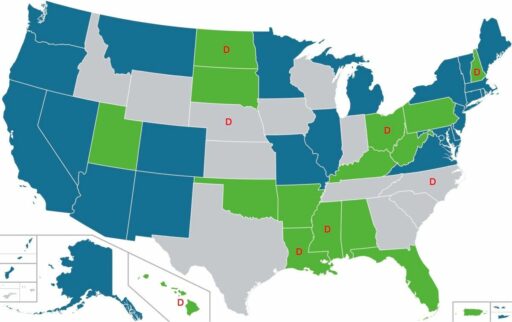The journey towards marijuana legalization at the federal level in the United States is a winding path marked by legislative complexity, regulatory challenges, and societal shifts. This article delves into the intricacies of federal marijuana legislation, the hurdles faced by cannabis businesses, and the broader legal and societal implications of this evolving landscape. We also explore how employers and industry stakeholders can prepare for potential changes in federal law and the future of cannabis education and research.
Key Takeaways
- Federal marijuana legislation is deeply intertwined with the Controlled Substances Act, and recent efforts to change this status quo face significant hurdles.
- Cannabis businesses must creatively navigate the dichotomy between federal trademark limitations and state-level protections to establish their brands.
- Legal challenges, such as those involving intrastate regulation, reflect the tension between state sovereignty and federal oversight in marijuana law.
- Anticipating and preparing for federal legal changes is essential for employers and stakeholders to adapt to the evolving cannabis sector.
- Educational initiatives and workplace safety are becoming increasingly important as employers grapple with the implications of marijuana legalization.
The Current State of Federal Marijuana Legislation

Understanding the Controlled Substances Act
At the heart of the federal stance on marijuana is the Controlled Substances Act (CSA), which categorizes drugs into different schedules based on their potential for abuse, medical use, and safety or dependence liability. Marijuana is currently classified as a Schedule I substance, indicating a high potential for abuse and no accepted medical use in the United States.
The CSA’s scheduling system is not static; it allows for substances to be reclassified through a regulatory process. This process involves scientific and medical evaluations by the Drug Enforcement Administration (DEA) and the Food and Drug Administration (FDA).
The DEA, by delegation from the Attorney General, has the authority to reschedule drugs or remove them from the schedules if they no longer meet the criteria for their current classification. The United States’ obligations under international treaties, such as the Single Convention on Narcotic Drugs, also influence the DEA’s rescheduling decisions.
- Schedule I: High potential for abuse, no accepted medical use.
- Schedule II: High potential for abuse, some accepted medical use.
- Schedule III-V: Lower potential for abuse, accepted medical uses.
The CSA’s impact extends beyond drug scheduling; it affects various aspects of federal policy, including patent and trademark issues for cannabis-related businesses. Despite recent discussions on federal legalization, marijuana’s Schedule I status remains a significant barrier to its legal acceptance and integration into the mainstream economy.
Recent Federal Legislative Efforts
In the dynamic arena of federal marijuana legislation, recent efforts have been marked by both progress and setbacks. Senate leadership has shown a persistent interest in advancing the SAFER Banking Act, which aims to address the banking challenges faced by cannabis businesses. Despite this interest, the passage of the bill remains uncertain due to concerns over certain provisions.
Federal action to reschedule marijuana is also gaining traction, with several bills under consideration. Notably, the Marijuana Opportunity Reinvestment and Expungement (MORE) Act seeks to remove marijuana from the Controlled Substances Act (CSA) and decriminalize it at the federal level. Similarly, the State Reform Act and the Strengthening the Tenth Amendment Through Entrusting States (STATES) Act propose reforms to federal cannabis policy.
While optimism persists among industry stakeholders, the path to consensus is fraught with challenges. The complexity of aligning Senate, House, and bipartisan interests makes the legislative journey particularly arduous.
The table below summarizes key federal legislative efforts and their current status:
| Bill Name | Aim | Current Status |
|---|---|---|
| SAFER Banking Act | Address banking issues for cannabis businesses | Uncertain passage due to provision concerns |
| MORE Act | Decriminalize marijuana at the federal level | Under consideration |
| State Reform Act | Reform federal cannabis policy | Under consideration |
| STATES Act | Strengthen states’ rights regarding cannabis laws | Under consideration |
The Role of the Department of Justice
The Department of Justice (DOJ) has played a pivotal role in interpreting and enforcing federal marijuana laws. The DOJ’s stance on marijuana legalization has evolved, reflecting broader societal shifts and legal challenges. The DOJ has argued that the Controlled Substances Act (CSA) is still a binding authority, referencing cases such as Gonzales to support its position.
Despite a policy of non-enforcement against state-legal marijuana activities, the DOJ maintains that the risk of prosecution under the CSA is neither substantial nor imminent. This stance underscores the complex interplay between federal intent and state-level legalization efforts.
The DOJ’s interpretation of the commerce clause and its historical evolution highlight the intricate balance of federal and state powers in regulating marijuana.
The DOJ’s recent arguments suggest a nuanced approach to federal marijuana policy, one that may allow states to continue as ‘laboratories of democracy’ while still upholding federal law.
Challenges and Strategies for Cannabis Businesses

Federal Trademark and Branding Issues
Navigating federal trademark issues for cannabis companies in the United States requires a nuanced understanding of both state and federal laws. While federal illegality poses a significant challenge, creative branding strategies, ancillary services, and state-level protections offer avenues for establishing and safeguarding a brand presence in this evolving industry. As the legal landscape continues to evolve, staying informed and adapting strategies accordingly will be crucial for the success of cannabis businesses.
Due to the current state of federal law, companies may want to try building their federal trademark rights and brand with lawful non-marijuana-derived goods which will encompass the marijuana goods.
Here are some steps to consider for protecting trademarks in the marijuana space:
- Crafting Trademarks: Focus on non-cannabis-related elements, such as distinctive logos or specific product names, to increase the chances of approval.
- Ancillary Services: Highlight the ancillary nature of your services to increase the likelihood of federal trademark approval.
- Proactive Enforcement: Infringement issues can still arise, and proactive enforcement is essential to protect brand integrity.
- State-Level Protections: Utilize state-level trademark registrations to build a brand presence and legal protections within individual states.
Navigating State vs. Federal Law Discrepancies
The interplay between state and federal marijuana laws presents a labyrinth for businesses and individuals alike. While state laws may offer more detailed regulations, they must not conflict with overarching federal statutes. The Supremacy Clause of the U.S. Constitution dictates that federal law overrides state law in cases of direct conflict, yet the enforcement of federal law is not always a given, leading to a precarious balance.
The discrepancy between cannabis laws at the state and federal levels continues to pose significant challenges. Businesses must navigate this complex landscape with caution and informed strategy.
Understanding the nuances of this relationship is crucial for compliance and strategic planning. Here’s a brief overview of key considerations:
- Federal Enforcement Priorities: Despite state legalization, federal agencies retain the authority to enforce federal law.
- State-Specific Regulations: Each state has its own set of laws and enforcement mechanisms, which may be more stringent.
- Legal Risks: Entities must assess the risk of federal intervention and adjust their operations accordingly.
- Advisory Services: Consulting with legal experts familiar with both federal and state laws is essential.
Ancillary Services and State-Level Protections
As the cannabis industry continues to grow, ancillary services have become a cornerstone for businesses navigating the complex legal environment. These services, which support the industry without directly handling the plant, often benefit from state-level protections. For instance, companies specializing in legal advice, financial services, and marketing have emerged to fill the gaps left by federal restrictions.
While federal illegality poses a significant challenge, creative branding strategies, ancillary services, and state-level protections offer avenues for cannabis companies to establish their presence. The following list highlights some key state-level protections that have been expanded or narrowed:
- Expansion of antiindemnity protections in states like Texas and Ohio.
- Narrowing of antiindemnity protections in states such as Oklahoma and Louisiana.
The legal landscape of antiindemnity statutes is constantly evolving, impacting businesses differently across industries and states. It is crucial for cannabis-related businesses to stay informed and work closely with legal counsel to navigate these changes effectively.
Legal Implications and Societal Reevaluation

The Intrastate Regulation Dilemma
The regulation of marijuana within state borders presents a unique challenge due to its interconnectedness with interstate commerce. The distinction between intrastate and interstate activities is blurred when it comes to cannabis, as the plant’s cultivation, manufacture, possession, distribution, and use can have far-reaching implications beyond state lines.
- The Intrastate Cultivation, Manufacture, Possession, Distribution, and Use of Marijuana Substantially Affects Interstate Commerce
- Federal authority to regulate intrastate activity hinges on its impact on interstate commerce
- The nature of the economic interaction between intrastate and interstate commerce is crucial
The complexity of this regulatory landscape is underscored by recent legal challenges. For instance, a lawsuit emphasized the difficulty in delineating the scope of federal versus state jurisdiction over cannabis-related activities.
The legal principle that intrastate economic activity substantially affecting interstate commerce falls under federal regulatory power remains a contentious issue. This principle is not influenced by whether the regulation aims to eradicate or support the interstate market.
Federalism and State Innovation
The interplay between federal and state laws has always been a delicate balance, with states often serving as laboratories of democracy. This principle allows states to experiment with policies, including those related to cannabis, which can then inform national legislation. The Department of Justice (DOJ) has recognized this approach, suggesting a shift towards allowing states more leeway in their cannabis policies.
In the context of marijuana legalization, this federalist approach has led to a patchwork of state laws. While some states have fully legalized cannabis, others have decriminalized it or allowed it for medical use only. This has created a complex landscape for businesses and individuals alike. Here are some key points to consider:
- The Supremacy Clause dictates that federal law generally takes precedence over state law.
- State laws must be more specific and are often the ones enforced due to the prevalence of state-level law enforcement.
- Conflicts between federal and state laws create challenges, especially in areas like banking, taxation, and interstate commerce.
The evolving relationship between federal and state legislation on cannabis underscores the need for clear guidelines and protections for states that choose to innovate and regulate marijuana within their borders.
The Impact of Legal Challenges on National Policy
The ongoing legal challenges in the marijuana sector have become a pivotal force in shaping national policy. The outcome of these challenges is crucial for determining the future regulatory framework that governs both intrastate and interstate commerce of cannabis.
As businesses and legal entities navigate the landscape, they encounter a complex interplay between state sovereignty and federal authority. This dynamic is particularly evident in the clash between state-led legalization efforts and federal oversight, which continues to evolve with each legal battle.
The legal reevaluation of marijuana’s role within the national market is a testament to the shifting perceptions and the need for a harmonious regulatory approach.
The Department of Justice (DOJ) finds itself at the center of this debate, defending federal statutes while states push forward with their own regulatory schemes. The DOJ’s stance, often rooted in precedent, underscores the intricate balance of federalism and the challenges it presents to stakeholders across the board.
Preparing for Potential Federal Legal Changes

Anticipating Shifts in the Legal Landscape
As the cannabis industry evolves, stakeholders must remain vigilant and proactive in anticipating shifts in the legal landscape. The complexity of marijuana legislation at the federal level requires continuous monitoring of legal developments and a keen understanding of how these changes can impact business operations.
To effectively navigate the legal landscape and ensure regulatory compliance, organizations should consider the following strategies:
- Staying informed through reliable sources, such as the Marijuana News website, which provides archives and recent posts on legislative updates.
- Conducting regular legal and regulatory due diligence to assess the implications of new laws.
- Engaging with legal experts who specialize in cannabis law to interpret complex regulations.
It is essential for businesses to adapt quickly to legal changes to maintain compliance and competitive advantage.
By preparing for potential changes, businesses can mitigate risks and position themselves for success in a dynamic regulatory environment. The ability to pivot and align with new regulations will be a defining factor for long-term sustainability in the cannabis sector.
Strategies for Employers and Industry Stakeholders
As the cannabis industry continues to grow, employers and industry stakeholders must navigate a rapidly changing legal environment. Preparation for potential federal changes is crucial, as these can significantly impact the operational and regulatory framework of businesses. Employers should focus on the following strategies:
- Staying informed about pending federal cannabis legislation, including aspects related to federal legalization, equity, financial protections/support, and research.
- Developing clear policies that address the stigma surrounding marijuana and foster a supportive workplace culture.
- Taking a proactive role in the marijuana conversation, advocating for progressive policies and inclusive societal stances.
Employers must balance the need for a safe and productive workforce with the rights and well-being of their employees. Crafting policies that accommodate medical marijuana users without compromising workplace safety is a complex but necessary endeavor.
Industry stakeholders should also consider compensation trends and how they align with evolving employment practices, especially in high-risk industries. The readiness to research, strategize, and communicate effectively will distinguish successful businesses in this sector.
The Future of Cannabis Education and Research
As the cannabis industry continues to flourish at the state level, educational institutions are grappling with the challenge of aligning their programs with federal regulations. Universities are at the forefront of this evolution, offering specialized courses that comply with current laws while preparing students for future changes in legislation. The lack of internship opportunities due to federal restrictions is a significant barrier, yet schools like URI and Johnson & Wales University are finding ways to provide valuable industry insights.
The future of cannabis education hinges on the potential harmonization of state and federal laws. A unified approach could lead to more comprehensive educational programs and research opportunities, fostering a generation of well-informed cannabis professionals. Given the historical inequities in cannabis laws and policies, there is an obligation on the part of researchers and policy makers to actively work toward rectifying past wrongs and ensuring equitable access to education and industry opportunities.
The evolving nature of cannabis legislation and its implications for higher education underscore the need for a continued dialogue and innovative solutions to support students’ aspirations in this rapidly growing field.
Employer Considerations in the Evolving Cannabis Sector

Workplace Policies on Marijuana Use
As the legal landscape of marijuana continues to evolve, employers are faced with the challenge of updating workplace policies to reflect the new realities. Clear and fair policies are essential for maintaining a safe and productive work environment while respecting employee rights. Medical cannabis is legal in 38 states, and employers must consider anti-discrimination policies for medical cannabis patients.
- Policy Development: Employers should establish comprehensive guidelines that address the use of marijuana both inside and outside the workplace.
- Safety and Productivity: Policies must balance the need for a safe work environment with the rights of employees who may be medical marijuana users.
- Education and Advocacy: It is crucial to educate employees about the implications of marijuana use and to foster a culture of self-responsibility.
Employers must navigate the delicate balance between ensuring workplace safety and respecting the privacy and rights of their employees. Crafting policies that accommodate medical marijuana users without compromising workplace standards is a complex but necessary task.
Balancing Employee Rights with Corporate Interests
In the evolving landscape of marijuana legalization, employers face the delicate task of balancing compassion with company interests. Crafting clear policies that support employees while protecting employers’ rights is essential, especially when considering accommodations for medical marijuana users. The challenge lies in accommodating medical users without compromising workplace safety or productivity.
Employers grapple with the question of privacy versus the need to ensure a safe and productive workforce. This balance requires a nuanced approach that respects individual rights while upholding corporate governance and ethics.
As the legal landscape evolves, so too must workplace policies. Employers should stay informed of compensation trends and best practices within the industry, particularly in high-risk sectors where safety is critical. Addressing the stigma associated with marijuana use is also crucial in fostering a supportive and inclusive workplace culture.
- Review and update workplace policies regularly.
- Educate employees on the implications of marijuana use.
- Implement clear guidelines for medical marijuana accommodations.
- Foster an inclusive environment that mitigates stigma.
Educational Initiatives and Workplace Safety
In the rapidly evolving cannabis sector, educational initiatives play a crucial role in maintaining workplace safety. Employers are increasingly recognizing the need to provide comprehensive training programs that address the health and safety risks associated with cannabis cultivation, processing, and retail jobs.
The integration of no-cost training initiatives, such as the Cannabis Workforce Initiative, underscores the commitment to equip employees with the knowledge to navigate potential risks effectively.
To ensure a safe and compliant workplace, the following steps are essential:
- Regularly updating workplace policies to reflect the latest legal changes.
- Conducting training sessions that cover compliance obligations and safety protocols.
- Establishing support systems, including mental health and substance use programs, to assist employees.
By striking a balance between educational programs and federal compliance, employers can foster a proactive culture of safety and well-being.
Conclusion
As we have explored throughout this article, the journey towards marijuana legalization at the federal level is fraught with complexity, marked by a patchwork of state laws, evolving public opinion, and ongoing legal challenges. The tension between state innovation and federal oversight continues to shape the regulatory landscape, presenting both obstacles and opportunities for businesses, policymakers, and individuals alike. The outcome of current legal battles and the potential for federal legislative changes will significantly influence the future of marijuana regulation. It is imperative for all stakeholders to remain informed and adaptable as the national conversation on marijuana progresses, ensuring readiness for the inevitable shifts in the legal and cultural framework surrounding cannabis.
Frequently Asked Questions
What is the Controlled Substances Act and how does it affect federal marijuana legislation?
The Controlled Substances Act (CSA) is a federal law that classifies drugs, substances, and certain chemicals used to make drugs into five categories or schedules based on their potential for abuse, medical use, and safety or dependency potential. Marijuana is currently classified as a Schedule I substance, indicating a high potential for abuse and no accepted medical use, which has significant implications for federal legislation and enforcement.
How are cannabis businesses navigating federal trademark and branding issues?
Cannabis businesses face challenges in securing federal trademarks due to marijuana’s Schedule I status under the CSA. However, they are employing creative strategies such as leveraging state-level protections, focusing on ancillary services, and developing distinctive branding that complies with both state and federal laws to establish and protect their market presence.
What are the legal implications of the recent lawsuit highlighting the complexity of regulating intrastate marijuana use?
The recent lawsuit emphasizes the tension between state-level legalization and federal oversight. It challenges the federal government’s authority to regulate marijuana within a state, which could lead to a reevaluation of marijuana’s place in national policy and potentially impact the regulatory framework governing intrastate and interstate commerce of cannabis.
How should employers prepare for potential federal legal changes regarding marijuana?
Employers should stay informed about legislative developments and consider proactive strategies that can accommodate potential shifts in the legal landscape. This includes reviewing and updating workplace policies, balancing employee rights with corporate interests, and investing in educational initiatives to ensure workplace safety and compliance.
What are the challenges of balancing employee rights with corporate interests in the evolving cannabis sector?
Employers must navigate the complex interplay between state laws that may allow marijuana use and federal laws that prohibit it. They need to create policies that respect employees’ rights in states where cannabis is legal while maintaining a safe and compliant workplace, which includes addressing issues related to impairment, privacy, and discrimination.
What is the significance of federalism and state innovation in the context of marijuana legalization?
Federalism allows states to act as laboratories of democracy, innovating and implementing their own marijuana policies. This state-led innovation can influence national policy and contribute to a societal reevaluation of marijuana regulation. However, it also creates a complex legal landscape due to the discrepancies between state and federal laws.





